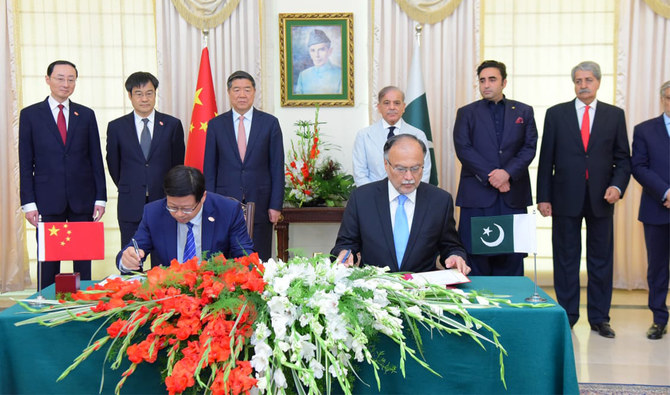By Staff Reporter
ISLAMABAD: Pakistan and China signed six agreements and memorandums of understanding on Monday to enhance bilateral cooperation in various fields, including trade, investment, infrastructure, and industrial development, Prime Minister Shehbaz Sharif said.
Sharif said that Pakistan was ready to contribute to Chinese President Xi Jinping’s vision of a shared destiny of progress and prosperity. He was speaking at a ceremony after holding talks with Chinese Vice Premier He Lifeng, who arrived in Islamabad on Sunday for a three-day visit to attend the 10th anniversary celebrations of the China-Pakistan Economic Corridor (CPEC), a flagship project of Xi’s Belt and Road Initiative.
“I have no doubts that we are entering into the second phase of CPEC and today we have signed certain important documents that will further enhance economic cooperation and we will undertake the second phase of CPEC under a new model,” Sharif said.
He said that under CPEC, more than $25 billion worth of investment had taken place in public transport, the power sector, and road infrastructure in Pakistan, which has been struggling with chronic power shortages and a sluggish economy.
CPEC is a major segment of Beijing’s Belt and Road infrastructure initiative, a $65 billion network of roads, railways, pipelines, and ports in Pakistan that will connect China to the Arabian Sea and help Islamabad expand and modernize its economy, with the Gwadar port city in Balochistan as the epicenter of it.
The agreements signed on Monday include a document on the joint cooperation committee of CPEC, a mechanism for experts exchange, export of dried chillies from Pakistan to China, realignment of Karakoram Highway Phase II project feasibility study, industrial workers’ exchange program, and promotion of bilateral trade.
Sharif said that Pakistan and China were also working on projects in information technology, agriculture, and social sectors under CPEC, which aims to link China’s western region with Pakistan’s Arabian Sea port of Gwadar through a network of roads, railways, pipelines, and power plants.
“The ML-1 and Karachi Circular railway system are very important projects and I have no doubts that together in time to come, we will successfully achieve these projects and many others,” he said, adding that it would make Pakistan stand on its own feet through sacrifice, hard work, and undying efforts.
He said that Pakistan was keen to learn from China’s experience in poverty alleviation, industrial development, and environmental protection.
He Lifeng, who heads China’s National Development and Reform Commission, praised Pakistan’s efforts to implement CPEC projects and said that China was committed to supporting its “all-weather” friend and partner.
He said that CPEC had brought tangible benefits to both countries and contributed to regional peace and stability.
The Chinese vice premier said that China was willing to work with Pakistan to deepen cooperation in various fields, expand trade and investment ties, promote people-to-people exchanges, and enhance coordination on regional and international issues.
Planning Minister Ahsan Iqbal and Cong Liang, vice-chairman of China’s National Development and Reforms Commission, signed two vital agreements pertaining to the joint cooperation committee of CPEC and the establishment of an experts exchange mechanism within the CPEC framework.
Separately, Pakistani President Arif Alvi bestowed the Chinese vice-premier with the “Hilal-e-Pakistan” award during a ceremony at the presidency in recognition of his significant contributions to CPEC.
In the afternoon, the Chinese delegation would attend a ceremony, themed as the “Decade of CPEC,” with the Chinese vice-premier as the chief guest.
Copyright © 2021 Independent Pakistan | All rights reserved




